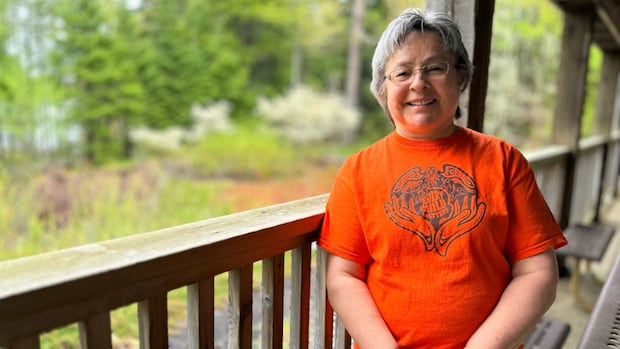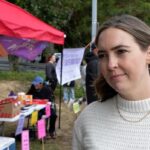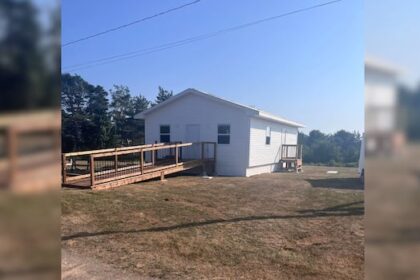British ColumbiaPhyllis Webstad’s Orange Shirt Story, which had its theatrical premiere last week in Kamloops, B.C., features Webstad telling the story of her experiences at St. Joseph’s Mission, a residential school near Williams Lake.Phyllis Webstad’s Orange Shirt Story aims to educate, while not re-traumatizing residential school survivorsCBC News · Posted: Sep 29, 2025 8:00 AM EDT | Last Updated: September 29Phyllis Webstad, creator of the Orange Shirt Day movement, is seen visiting the Wolastoqey immersion school in Fredericton in 2023. A new documentary about Webstad aims to provide a pathway forward. (Ann Paul/CBC)WARNING: This story contains details of experiences at residential schools.A documentary about the founder of Orange Shirt Day aims to provide education about the history of residential school survivors — while not re-traumatizing them in the process.Phyllis Webstad’s Orange Shirt Story, which had its theatrical premiere last week in Kamloops, B.C., features Webstad telling the story of her experiences at St. Joseph’s Mission, a residential school near Williams Lake.When she got there as a six-year-old, she was forced to take off a new orange shirt that her grandmother had bought for her — along with the rest of her clothing.It was a moment that eventually led to the founding of Orange Shirt Day in 2013, marked every year on Sept. 30, a countrywide movement that sees people wear orange shirts, honour residential school survivors and remember the children that died there.Webstad is seen speaking as Tk’emlúps te Secwépemc Kúkpi7 (Chief) Rosanne Casimir listens in September 2021 at a B.C. Lions event. Webstad has shared her story numerous times. (Darryl Dyck/The Canadian Press)Webstad has told her story numerous times — over multiple books and on the Orange Shirt Day website.And she’s telling the story again for a new documentary — which was produced by the International Indigenous Speakers Bureau (IISB) — in what the filmmakers hope serves as a learning moment for people across the world.”It actually gives people context about what it was like being part of Phyllis’s family and lineage in these territories prior to [residential schools],” said Kathaleen (Shannon) Loutitt, co-founder of the IISB.”And it talks about what hope that she has for us going forward,” she added. “It also brings truth and clarity to folks about Sept. 30, of why that day.”Kathaleen (Shannon) Loutitt of the International Indigenous Speakers Bureau is seen before the first theatrical screening of Phyllis Webstad’s Orange Shirt Story in Kamloops, B.C., on Sept. 22. (Jenifer Norwell/CBC)In promoting the documentary, Webstad wasn’t made available for interviews.That was intentional, according to Loutitt, as she believes that residential school survivors shouldn’t have to relive their trauma over and over again in order for people to educate themselves.”If they’re willing to share their story, we only ever want them to have to share it once … and so we’re very fortunate that Phyllis did that with us, and that we were able to curate this to bring it forward, for people to learn,” she told CBC’s Daybreak Kamloops.Loutitt says she was grateful to Webstad for sharing her experiences with the documentary producers. (Jenifer Norwell/CBC)Loutitt said the documentary helps provide a “bridge point” for people of all kinds, where they could gather and form an understanding of how to move forward together.”It’s the one story that Phyllis has gifted us, that all of us need to know right across this country,” she said.”Because from that we can move forward, in our many different directions.”LISTEN | Film makes debut in Kamloops: Daybreak Kamloops7:38Orange Shirt Day film makes its theatrical debutThe world theatrical premiere of Phyllis Webstad’s Orange Shirt Story is happening at the Paramount in Kamloops.Phyllis Webstad’s Orange Shirt Story had its theatrical premiere last Monday in Kamloops — the city that has become well known in recent years for its proximity to the Kamloops Indian Residential School.That was where the Tk̓emlúps te Secwépemc First Nation announced in 2021 that preliminary findings from a ground-penetrating radar survey had found some 200 potential unmarked graves on the institution’s grounds.That announcement was the beginning of a nationwide movement as First Nations across the country began their own searches of residential school sites and non-Indigenous Canadians began to comprehend the significance of the harms perpetrated at those institutions.In the trailer for the documentary, Webstad said she could never have imagined that the discovery would wake up the world in the way that it did.She added that she was grateful that orange shirts were being worn on Sept. 30 as a symbol of healing and hope.A national 24-hour Indian Residential School Crisis Line is available at 1-866-925-4419 for emotional and crisis referral services for survivors and those affected. Mental health counselling and crisis support are also available 24 hours a day, seven days a week through the Hope for Wellness hotline at 1-855-242-3310 or by online chat.With files from Daybreak Kamloops and Jenifer Norwell
Documentary about Orange Shirt Day founder provides pathway forward, filmmakers say











